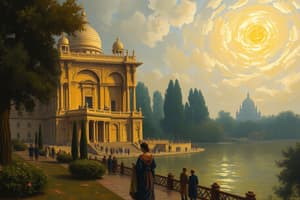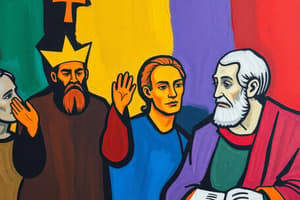Podcast
Questions and Answers
What key principle did the United States seek to uphold in its founding?
What key principle did the United States seek to uphold in its founding?
- Establishment of an official state religion
- Promotion of specific religious practices
- Separation of church and state (correct)
- Regulation of religious institutions
What amendment in the U.S. Constitution addresses the issue of religion?
What amendment in the U.S. Constitution addresses the issue of religion?
- The First Amendment (correct)
- The Second Amendment
- The Fifth Amendment
- The Tenth Amendment
What is an ongoing debate regarding the First Amendment?
What is an ongoing debate regarding the First Amendment?
- Whether it prohibits any accommodation of religious practices
- Whether it establishes a specific state religion
- Whether it allows for complete separation of church and state (correct)
- Whether it applies to federal and state governments
Which of the following issues is mentioned as involving moral and ethical dilemmas related to religion?
Which of the following issues is mentioned as involving moral and ethical dilemmas related to religion?
How does the text describe the approach of different countries regarding religion and government?
How does the text describe the approach of different countries regarding religion and government?
Why is the ongoing dialogue surrounding religion and government essential?
Why is the ongoing dialogue surrounding religion and government essential?
What is the main focus of the article?
What is the main focus of the article?
What was the relationship between Christianity and the Roman Empire?
What was the relationship between Christianity and the Roman Empire?
What was the impact of the Enlightenment on the relationship between religion and government?
What was the impact of the Enlightenment on the relationship between religion and government?
What principle does the First Amendment to the U.S. Constitution establish?
What principle does the First Amendment to the U.S. Constitution establish?
What is the primary purpose of the article?
What is the primary purpose of the article?
What is the significance of the separation of church and state principle?
What is the significance of the separation of church and state principle?
Flashcards are hidden until you start studying
Study Notes
Religion and Government
Religion and government have been intertwined throughout history, with many nations basing their legal systems on religious principles. However, this relationship is complex and can lead to conflict and division. This article explores the intersection of religion and government, focusing on the United States and its separation of church and state principle.
History of Religion and Government Interaction
The historical interaction between religion and government has varied greatly depending on culture, location, and time period. For instance, in ancient Rome, Christianity was eventually adopted as the official religion by Emperor Constantine I in the early fourth century AD. However, this adoption did not mean the end of persecution against Christians, who continued to face various forms of discrimination until the late Roman Empire's decline.
In more recent times, religious freedom became a central issue during the Enlightenment, leading to the establishment of secular governments and the separation of church and state in Europe. This trend continued into the modern era, with numerous constitutions explicitly stating the separation of religion and government. An example would be the First Amendment to the U.S. Constitution, which prohibits the government from establishing any particular religion and guarantees the free exercise of religion.
The United States and Separation of Church and State
The United States, founded in 1776, sought to create a new form of government that protected individual rights and freedoms, including freedom of conscience, speech, press, assembly, and religion. This protection was written into the U.S. Constitution through the Bill of Rights, specifically the First Amendment. As a result, the U.S. government maintains "a strict policy of neutrality toward all religions," meaning it does not endorse, promote, or establish any particular faith.
Despite this principle, there have been ongoing debates over how to balance religious freedoms with the government's role in regulating public life. One such debate centers around what the First Amendment means when it says Congress shall make no law respecting an establishment of religion or prohibiting the free exercise thereof. While some argue that it implies complete separation, others believe it allows for accommodation of religious practices within certain limits.
Challenges in Balancing Religion and Government
Balancing the interests of religion and government is often a difficult task. In the United States, the phrase "separation of church and state" has become synonymous with the idea of a society where these two realms do not overlap. Yet, challenges persist, especially regarding issues like abortion, stem cell research, gay marriage, and education curricula, among others. These matters involve moral and ethical dilemmas that, while they may not directly concern religion, still touch upon deeply held beliefs and values.
As the world becomes increasingly globalized, the tension between religion and government continues to evolve, with countries dealing with the implications in different ways. Some countries maintain close ties with religious institutions, while others actively seek to distance themselves from them. Regardless of the approach taken, the ongoing dialogue surrounding religion and government remains essential for understanding the dynamics of societal structures across cultures worldwide.
Studying That Suits You
Use AI to generate personalized quizzes and flashcards to suit your learning preferences.





